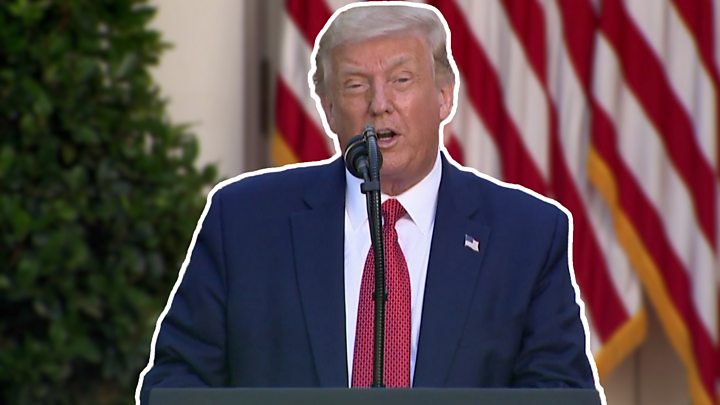The US Treasury has imposed sanctions on Hong Kong chief executive Carrie Lam, and 10 other top officials from Hong Kong and mainland China.
The sanctions were used to target those undermining Hong Kong's autonomy, said Treasury Secretary Steven Mnuchin.
"The United States stands with the people of Hong Kong," Mr Mnuchin added.
The move comes weeks after China imposed a controversial national security law on Hong Kong, which critics say threatened its freedoms.
US-China tensions continue to escalate - only a few hours ago, the Trump administration moved to ban US transactions with the Chinese owners of the WeChat and TikTok apps..
Among those sanctioned are Hong Kong's police commissioner and several political secretaries.
The US Treasury directly accused Ms Lam of "implementing Beijing's policies of suppression of freedom and democratic processes".
"In 2019, Lam pushed for an update to Hong Kong's extradition arrangements to allow for extradition to the mainland, setting off a series of massive opposition demonstrations in Hong Kong," the US Treasury added in a statement.
Hong Kong's security law
The US has strongly criticised Hong Kong's national security law, with US Secretary of State Mike Pompeo calling it an "Orwellian move" and an assault "on the rights and freedoms of the people of Hong Kong".
China has defended its controversial law as necessary to stop foreign interference in Hong Kong and the often violent pro-democracy protests that took place last year.
Announcing the sanctions on Friday, Mr Pompeo said: "The Chinese Communist Party has made clear that Hong Kong will never again enjoy the high degree of autonomy that Beijing itself promised to the Hong Kong people and the United Kingdom for 50 years.
"President Trump has made clear that the United States will therefore treat Hong Kong as 'one country, one system' and take action against individuals who have crushed the Hong Kong people's freedoms."
The 11 sanctioned officials will have all property in the US seized and financial assets frozen.
Ms Lam has previously scoffed at the suggestion of sanctions, saying last month: "I do not have any assets in the United States nor do I long for moving to the United States."
She told reporters she would "just laugh it off" if the US sanctioned her.
The latest sanctions were authorised by an executive order Mr Trump signed in July aimed at punished China for its role in Hong Kong's affairs.

Media playback is unsupported on your device
What else has happened with US-China relations?
Tensions between the US and China have risen at an accelerated pace in recent months.
The White House has accused China of lying about the origins of the coronavirus, which emerged from China late last year; of using social media apps to spy on Americans; of "stealing" intellectual property and of hiding a wanted criminal within a Chinese embassy in the US - to name only a few allegations.
Both countries ordered each other's consulates in major cities to close last month as tensions rose.
The US has also pressured partners in the Five Eyes intelligence alliance- Australia, Canada, New Zealand and the UK - to ban China's Huawei 5G telecoms systems, citing national security concerns.
China has expelled journalists from major US newspapers after the US placed new restrictions on Chinese media outlets that are affiliated with the country's communist government.
Earlier this month China issued arrest warrants for six pro-democracy activists, including an American citizen.
China's push into the South China Sea has also alarmed its neighbours as well as the US, which has increased the pace navy patrols sent into the sea to counter Chinese expansion.
Limited impact but highly symbolic
Analysis by Zhaoyin Feng, BBC News Chinese, Washington
The US sanctions on Chinese and Hong Kong officials had been looming for weeks.
The actual personal impact on these Hong Kong-based officials may be limited if they have no financial interests in the US and no plans to travel there.
And Carrie Lam herself said recently that she is not afraid of the sanctions.
But this move is highly symbolic, as it's Washington's latest step condemning Beijing's drive to curtail freedoms and democracy in Hong Kong. The former British colony has become a major point of contention between the US and China.
The world's two largest economies seem to be going through a painful "divorce," with a consequential US presidential election only three months away.
What does Washington get out of this? By being tough on Beijing the Trump administration is trying to rally voters, while the China hawks in the White House are aiming to correct the course of the bilateral relations in which they believe China has gained more than America.
Who are the sanctioned officials?
In addition to Ms Lam, the US also placed sanctions on Chris Tang, the commissioner of the Hong Kong Police Force, and his predecessor Stephen Lo, who directed the police force until 2019.
"Under [Mr Lo's] leadership, over 4,000 protestors were arrested and 1,600 injured in clashes," the US Treasury said.
Hong Kong's Justice Secretary Teresa Cheng and Security Secretary John Lee were also sanctioned.
World - Latest - Google News
August 08, 2020 at 01:28AM
https://ift.tt/30DN89y
Hong Kong: US imposes sanctions on chief executive Carrie Lam - BBC News
World - Latest - Google News
https://ift.tt/2SeTG7d
Bagikan Berita Ini














0 Response to "Hong Kong: US imposes sanctions on chief executive Carrie Lam - BBC News"
Post a Comment